- by Alison
Dengue in Reunion: Increasing the risk of dengue in France
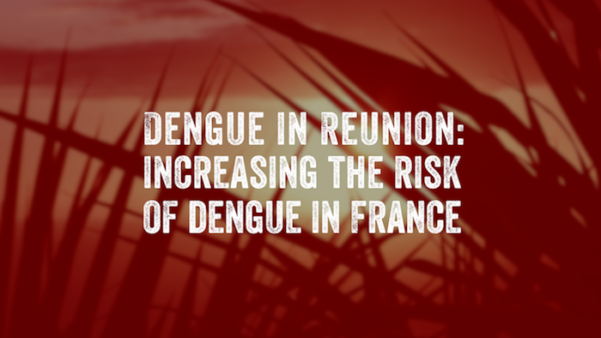
The French island of Reunion is currently facing an unprecedented number of dengue cases– a more than 30-fold increase on 2017. The primary vector, Aedes albopictus, is also established in some European countries, including southern France. The mere presence of these mosquitoes makes the threat of dengue in Europe real, as we discussed earlier this year. With thousands of tourists traveling from France to Réunion each year, can we expect to see dengue in France sometime soon?
It’s not unusual to see outbreaks of dengue in Reunion, a French overseas territory situated east of Madagascar and southwest of Mauritius in the Indian Ocean. The island typically sees between 10 and 250 dengue cases each year. While major outbreaks are rare, one in the summer of 1997/8 is thought to have infected 30% of the population.
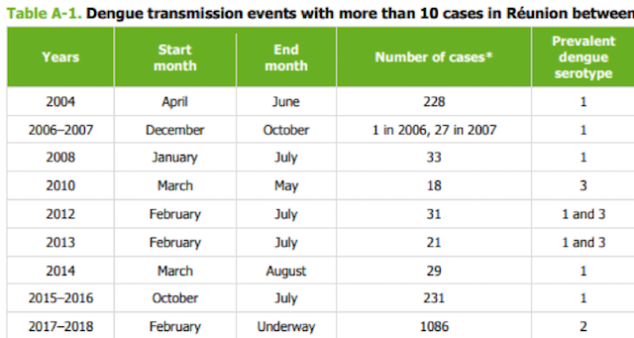
Image source: ECDC
[While both Aedes albopictus and Aedes aegypti mosquitos live on the island, Aedes albopictus is dominant and believed to be the main dengue vector. Local dengue transmission typically consists of a mix of the DENV-1, DENV-2 and DENV-3 serotypes with DENV-2 currently dominating. In 2016, it was DENV-1. Before that, in 2014, it was DENV-2.
Dengue in Reunion – rising case numbers
Case numbers of dengue in Réunion have risen sharply since the beginning of 2018. Numbers had grown to 1,816 autochthonous cases (all DENV-2) by 23rd April, including 50 hospitalizations, according to the World Health Organization.
Just a few weeks later, on 16th May, the French Public Health authority reported 2,980 cases of biologically confirmed or probable dengue in Reunion for 2018. This included 1,407 cases during April alone, 356 of them during the last week of April. It noted a further 388 cases during the first week of May.
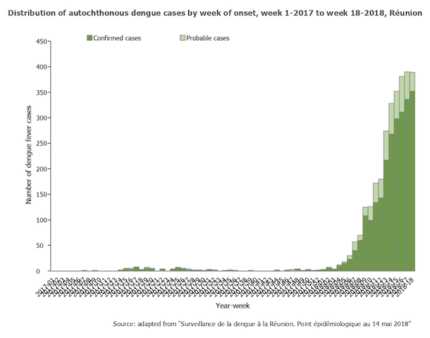
Though not fully understood, possible causes of the outbreak include:
• A significant proportion of the local population had not previously been exposed to dengue.
• A high proportion of cases were asymptomatic, allowing the virus to spread unnoticed until now.
• Tropical cyclones Berguitta and Dumazile providing a suitable environment for the mosquitoes to thrive while hampering vector control activities.
Click here to sign the petition for a World Dengue Day
There is one other possible explanation – that Aedes albopictus has mutated locally in Réunion. While there is no evidence of this as yet, further investigations are needed.
A long but quiet 2017
Transmission patterns for dengue in Réunion during 2017 were far from normal; this might also be significant.
Reunion’s mosquito populations are at their most dense during the humid season: from December to April. While the mosquitoes can remain active throughout the year, dengue transmission typically finishes after July – the beginning of the southern-hemisphere winter, according to the European Centre for Disease Prevention and Control (ECDC).
But 2017 was very different. While dengue case numbers were an extremely low number (103 in total), transmission continued throughout the year – even during winter months.
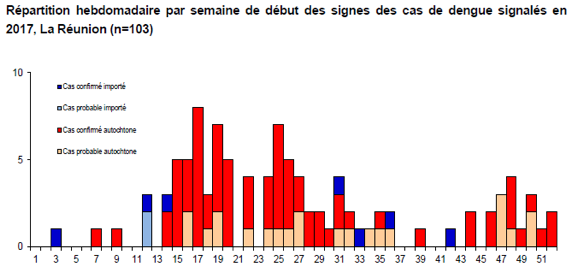
With winter fast approaching, weather conditions are suiting the mosquitoes again this year, just like they did in 2017. If the virus persists during the 2018 winter months, the island is at risk of an epidemic during its 2018/2019 summer.
What does this mean for Europe?
Reunion is a popular tourist destination, meaning a large number of people travel not only to but also from it each year. In fact, an average of 500,000 people travels from Reunion to Europe every year, mostly to mainland France. Peak travel periods are from December to January and July to August.
The current outbreak increases the likelihood of dengue in Europe, notably in France. Infected travelers could bring dengue to areas where mosquitoes, Aedes albopictus in particular, are already established. This includes France, which reported one dengue case imported from Reunion in 2016.
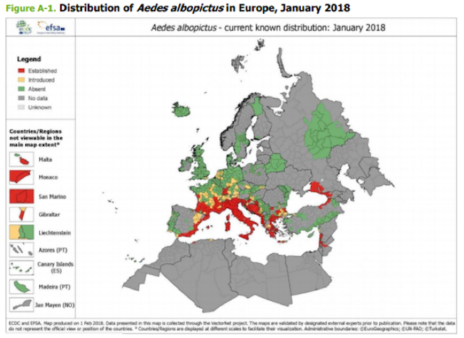
Image via ECDC
With the summer imminent and temperatures on the rise, France’s mosquito populations will likely grow in the coming weeks and continue to do so until early autumn. This increases the risk of local dengue transmission – and potentially an outbreak – if an infected traveler were to return to France having contracted dengue in Réunion.
The ECDC has highlighted the importance of early detection, particularly during the warm summer months and in southern Europe, to prevent the disease from becoming established. It advises any locally transmitted dengue should trigger investigations to “assess the potential for onward transmission and guide vector control measures.”
If you’ve been lucky enough to travel to Reunion but unfortunate enough to experience dengue, get in touch. We’d love to hear your story.
—
Click below to report dengue activity near you and get access to up-to-the-minute, crowdsourced reports on outbreaks.

